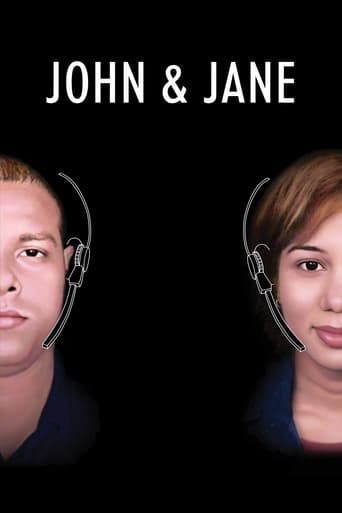Incannerax
What a waste of my time!!!
LouHomey
From my favorite movies..
Comwayon
A Disappointing Continuation
Neive Bellamy
Excellent and certainly provocative... If nothing else, the film is a real conversation starter.
mamlukman
We wanted to see this in Toronto in Sept. 2005, but it was sold out. So we saw it at the DC Filmfest April 23, 2006. Some people will see it as rather boring and uninvolving. However, I thought it was impressive on several levels. As you go through the six sketches about the call center workers, it takes a while to realize that once you've left a character, that's it, you're not going back to see what happened to them. Enough is shown about each character to show you the essence of what makes them tick, but not enough to get you too emotionally involved. No matter what attitude you bring into the movie (mine was "the call centers are probably exploiting these people and overworking them"), your attitude will change during the movie. Certainly the first character, Glen, summed up what my feelings would probably be--trapped, hates the job, but see no way to escape. But that's Glen. As you go on, you see that the others really love their jobs and their lives, and that their lives have been transformed at a much deeper level by the job and the environment. I think for the real meaning of the movie you have to go back to the opening narration--it's a virtual life, with real people trapped in it. Some of them begin to see this virtual life as reality. Whether that's good or bad, I'm not sure--is it better to see the world completely realistically? Wouldn't you just commit suicide?--but to some extent we are all in the same boat, and that's what makes this movie much more than a documentary about a call center in Bombay.
OlivieFOURNIER
This excellent new film from India is showing for the first time in Europe at the Berlin Film Festival. After great reviews at Toronto, I expected a very stupid film like Super Size Me... no, this turned out quite surreal - what a scary, weird and odd world this film shows us. And it is all real - our strange 21st world! The film was voted one of the best undistributed films of the year in the US by both The Village Voice and Indiewire, who have their pulse on new independent cinema."In vast, fluorescent rooms, thousands of ambitious young Indians talk to people in Kentucky, California or Idaho. Bridging continents by telephone, they pitch products and soothe frayed consumer nerves. As they troubleshoot, they dream of America. As they dream, they change. What is it like to transport yourself to a remote land you've never even seen? How does it feel to live so far outside your own body? Welcome to the world of offshore call centers. John & Jane is an astonishing look at the souls of the outsourced. Shot on 35mm and composed with unsettling grace, this documentary finds an entirely original and fitting language to express the eerie dislocation of virtual work. The lives it depicts are real, but the film's approach gives those lives the scope of speculative fiction."The music is really beautiful, too - very ambient and chilling - with electronic musicians from all over contributing to the score, including Germany's Thomas Brinkmann and Japan's Minamo.For anyone who likes films that don't leave you easily - this is a must see!
Christophe Menager
I got to grab the last two tickets to a sold-out show of "John & Jane" at the Toronto Film Festival. This film is absolutely brilliant! At first, you aren't sure what the film IS really about...yes, of course, we are told it is a documentary about Indians who work at night answering American 1-800 calls, but beyond that you keep asking yourself "what is the point? where is this heading?" - some people I spoke to just didn't get it at all and felt "let down" by the lack of a conventional structure or storyline…which is EXACTLY what I'm getting to… About 30 minutes into the film, after you have spent time with two call centre workers who (understandably) hate their jobs, you get a character who goes by the telephone alias "Osmond" - he tells you that, in fact, he quite likes the job and is on his way to becoming a billionaire! Osmond is followed by a mysterious girl called "Niki Cooper" who loves the job even more than he does, explaining that the call centre is like her family and that she loves all her callers! This film f**ks with your head… Slowly, a picture of transformation emerges. No, there is no straight story line here, but each character builds on the character that precedes it…until you arrive at the near-cyborg "Naomi" – who looks American but is clearly Indian. Her face is bleached white and hair is synthetic blond. Yes, then the "story" is clear as day – the Indian has "become" a sort of virtual American, physically, mentally and emotionally! Mind you, this is not science fiction or fantasy. It is a "documentary" although the film subtly destroys many documentary conventions. It is actually a piece of experimental film-making in the guise of a pop-doc, which is why viewers looking for a film on outsourcing may be disappointed. "John & Jane" uses outsourcing issue as a way to bring viewers in – but the film is clearly about the idea of "America" as a utopia for so many people in the world.If you are looking for a straight-up BBC film on call centres, STAY AWAY. On the other hand, if you have an open mind and are adventurous about new kinds of film-making, "John & Jane" may be just the thing for you.
Henry Kwan
One of the most anticipated films of the 2005 Toronto Film Festival, John & Jane recounts the hopes and dreams of six call centre agents in India who offer long-distance goods and services to Americans. They are encouraged to adopt American names, accents and values – individualism, success, progress, the pursuit of happiness – to veil their Indian-ness. The film is a work of non-fiction that speaks to the painful ironies of globalization and inequity using the lush cinematic vocabulary of a polished feature. When I ask director and editor Ashim Ahluwalia about the remarkable look of his documentary, he replies: "Certain things are seen as documentary and certain things are seen as fiction based more on the medium that you are using and the style of the shooting than the actual content. For example, you shoot something hand-held and it becomes documentary; you shoot it static and it becomes fiction. So I was interested in just what happens if you shoot something on 35mm film and static and it's the same material that you would otherwise shoot on DV and hand-held. "It was a challenge to see if we could do something on 35mm that could be intimate and at the same time still fall in this strange liminal space between fiction and non-fiction… I honestly have a problem with the whole cinemavérité thing – the idea that you can be present in a room and nobody knows. You might as well feel like it's fiction and be conscious of the artifice. These guys are also faking who they are; they are fictionalizing themselves, they have fake names, fake identities within this fiction/ non-fiction space." Rather than intercutting the stories of Glen, Sydney, Osmond, Nikki, Nicholas and Naomi, Ahluwalia primarily presents them to us one after the other in a series of portraits: "The film was structured as a transformation process from someone who really hates his job to someone who really loves it; there's an underlying journey that's happening from an Indian boy and girl to a final sort of "John" and "Jane," virtual American characters… In a strange way I think of all six of them as the journey of one person." From Osmond filling the void of a parent's death by devoting himself to Amway to Naomi feeling the need to repeat three times that she is naturally blonde, each scene is as piercing as the voice of Glen's mother waking him from peaceful slumber. The subjects' glorified, mythic image of the United States is one cobbled together from platitudes, Hollywood movies and Sears catalogues; Americans are described as "casual" and "nice" while treating the call centre agents as irritants ("we're some f**king human beings here," Glen poignantly pleads). But the charged relationship between a land of plenty and one of deprivation cuts both ways: one agent curtly dispatches a woman who dialed the wrong number to report domestic abuse while another coercively pressures an elderly man to purchase a long distance calling plan. Despite the tragicomic political truths of their American obsession, Ahluwalia never judges his subjects, treading a fine line between critique and affection. "You have a certain kind of baggage that you enter a space with, but I think that eventually you have to let it go and become much more empathetic because things are not as clear-cut. A lot of people think that it's just a straight-up political film but it's much more grey than that… When you're within it and spending a lot of time with people, you begin to understand the logic of why they would actually do what they do so that it becomes very difficult to be judgmental. You have to be much more open and just let the grey area pop out a bit and let it be… let it just be open-ended like that."JON DAVIS, September 14th, 2005

